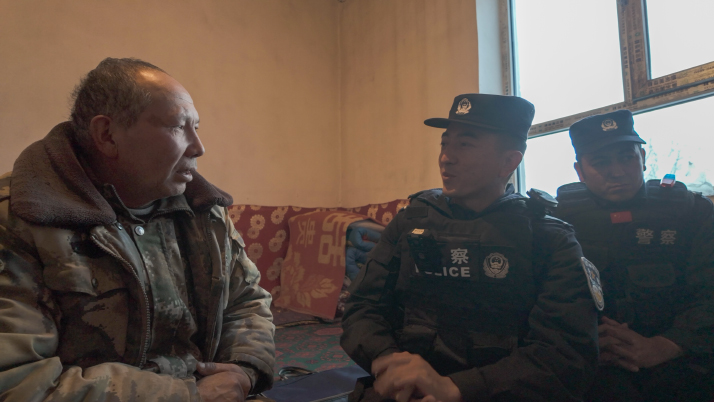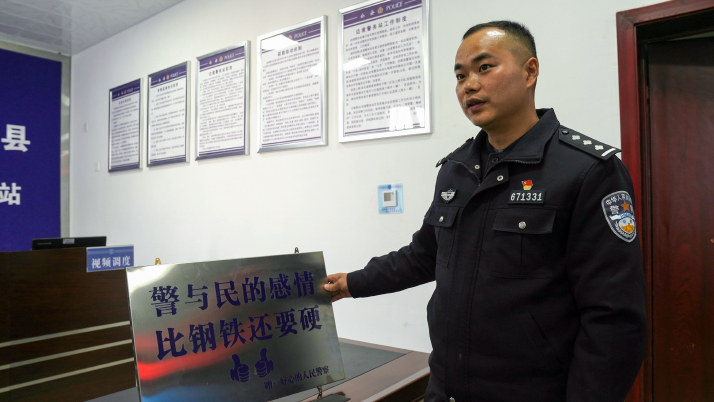| China |
| Glimpse into the daily work and life of police officers in Xinjiang | |
|
|
 Elyar Abdulim (right) visits a household in Heya Village in Aksu Prefecture, Xinjiang Uygur Autonomous Region in northwest China, on January 23 (ZHANG WEI)
Of the 439 households in Heya Village, Aksu Prefecture in Xinjiang Uygur Autonomous Region in northwest China, local police officer Elyar Abdulim, who has worked in the village for about a year, is very familiar with 50 of them. His goal is to get to know every villager so he can better understand their needs and help them with their work and daily life. "Public assistance and community service are two of my main tasks. It's a challenging, fulfilling and touching job for me," the 29-year-old working at the Heya police office of the Akeqing Border Police Station told Beijing Review. A helping hand Elyar spends most of his days conducting door-to-door visits in Heya, located in the Tianshan Mountains, a range that bisects Xinjiang. He and his colleagues try to get a basic understanding of the residents' individual situations. In particular, they look into whether households have any ongoing disputes or conflicts with others in the village. They also assess if there are any elderly or disabled family members who may not be able to fully care for themselves. Elyar and his team make sure they listen attentively to any difficulties the villagers are facing or any requests they may have. These requirements may sometimes seem trivial. "For example, in winter, when some households run out of coal for heating, we will provide them with free coal to tide them over," Elyar explained. "When I notice their daily essentials, such as mugs, are too worn-out for use, I sometimes will buy new ones for them." He also teaches senior villagers how to use smartphones—and how to steer clear of telecommunications fraud. Elyar has also played the role of a peacemaker, helping to resolve family disputes. He recalled one particular household visit during which a 39-year-old male family member suddenly broke down in tears during their conversation. As Elyar continued to speak with him, he learned the man had been embroiled in frequent fights with his father and stepmother over petty family matters, leaving him in a prolonged state of depression. Elyar listened intently to the man's stories, offered him advice and tried to lift his spirits. The comfort and support from an outside party helped the man work through his troubles. Elyar then also spoke with the father and stepmother, further defusing the tensions within the family. Over time, more villagers began seeking out Elyar for help and counsel regarding their personal issues. Elyar was happy to lend a sympathetic ear and provide guidance. "The fellow villagers have gradually come to trust me and open up to me. This is the result of devoting my time and increasing my interactions with them. I am committed to living up to their trust," he said. Elyar added that even as a young man, he has already learned a great deal about communicating with many different people and gained valuable life wisdom from the more senior villagers. Born in Aksu City in the eponymous prefecture, Elyar has felt that people's connections with each other in the countryside are closer than in the cities. However, the trust he now enjoys was not built overnight. When Elyar first started working at the Heya police office, he could sense the villagers' suspicion and defensiveness toward this outsider in uniform. "All you need is patience and a genuine desire to do good and serve the people. Eventually, the villagers will feel you are here to help them," he said.  Cheng Jikui displays a plaque, given to him by a grateful traveler he'd helped, at the Shenmuyuan border police post in Aksu on January 23 (ZHANG WEI)
Tighter connections Much like Elyar, Cheng Jikui, a police officer working at the border police post at Shenmuyuan in Aksu, also finds fulfillment in his connection with local villagers and travelers alike. Shenmuyuan, a forest park with millennia-old trees of various distinctive shapes, welcomes many visitors from all corners of the country every year. On November 18, 2023, a couple encountered a predicament when returning from a visit to Shenmuyuan. Their off-road vehicle had become stuck in the soft, deep sand along a nearby riverbank. Despite spending about an hour trying to free the vehicle themselves, their efforts proved in vain. Desperate, they called for help but struggled to convey their exact location since there were no clear landmarks around. But just as the tourists were about to give up, they spotted Cheng's patrol car. Cheng and his colleague quickly grabbed shovels from their vehicle and got to work. They began by clearing the loose sand surrounding the stuck car and then found some large rocks to place under the tires for traction. After that, the officers hooked up a tow rope and slowly pulled the vehicle out of the sandy trap. The entire rescue operation took about an hour, but thanks to the police officers' quick thinking and hard work, the couple was able to continue their way home. Deeply grateful, one of the travelers, surnamed Pan, had a special plaque made to show his appreciation. It read: "The bond between police and people is stronger than steel. —To the kindhearted policemen." "I was just doing my job, but their gratitude was truly heartwarming and motivating," Cheng told Beijing Review. "It made me want to be even better at serving the community." On other days, Cheng's job includes patrolling the border area, as his police post is near the China-Kyrgyzstan border, assisting passersby with tasks such as repairing or changing tires, and answering villagers' calls for help, like rescuing goats that have fallen into water. Though repetitive work can admittedly get a little boring, Cheng said he'd learned valuable lessons from every incident, enhancing his problem-solving skills with each subsequent occurrence. The most challenging issue Cheng faces is being away from his family. Cheng's family lives in his hometown in Anhui Province in east China, and he only gets to see them during long holidays, amounting to about one or two months a year. "After returning [to the post] following longer breaks, I tend to feel a bit upset, especially when my 4-year-old son tells me he misses me when we video chat," Cheng said, adding that when considering factors such as education and living standards, their current situation is the best option for the family, despite the distance. "The officers here are all committed to staying at their posts, even though some of us are sacrificing personal interests for the greater good," Cheng said. "Because if everyone looked at these challenging conditions and just decided to leave, then who would be left to serve the community here?" (Reporting from Aksu Prefecture, Xinjiang Uygur Autonomous Region) Copyedited by Elsbeth van Paridon Comments to luyan@cicgamericas.com |
|
||||||||||||||||||||||||||||
|
